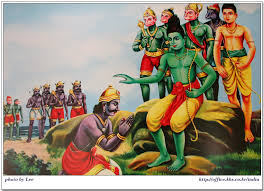Vibhishana
Vibhishana (Devanagari: विभीषण IAST: Vibhīṣaṇa or Bibhishan) was a king of Lanka in the legendary epic Ramayana. He was younger brother of the Rakshasa king Ravana of Lanka. Though a Rakshasa himself, Vibhishana was of a noble character and advised Ravana, who kidnapped and abducted Sita, to return her to her husband Rama in an orderly fashion and promptly which Ravana refused sternly. When Ravana did not heed his advice, Vibhishana deserted Ravana and joined Rama's army. Later, when Rama defeated Ravana, Rama crowned Vibhishana as the king of Lanka.
Vibhishana had a sattvic (pure) mind and a sattvic heart. From his early childhood, he spent all his time meditating on the name of the Lord. Eventually, Brahma appeared and offered him any boon he wanted. Vibhishana, said that the only thing he wanted was to have his mind fixed at the feet of the Lord as pure as lotus leaves (charan kamal). He prayed that he should be given the strength by which he would always be at the feet of the Lord and that he would receive the darshan (holy sight) of Lord Vishnu. This prayer was fulfilled and he was able to give up all his wealth and family, and join Rama, who was Avatar (God incarnate).
Vibhishana was youngest son of Kaikesi and Sage Vishrava, who was son of Sage Pulatsya, one of the Heavenly Guardians. He (Vibhishana) was younger brother of the Lord of Lanka, Ravana and King of Sleep, Kumbakarna. Even though he was born in the demon race, he was alert and pious and considered himself a Brahmin, since his father was intuitively such.
Due to Vibhishana's differences with Ravana because he was against the act of kidnapping Sita and most of all because Ravana wanted the throne for himself, he fled Lanka. His mother, Kaikesi, advised him to go and serve Shri Rama, who was at that time assembling an army to conquer Ravana and to recover Sita. He divulged the secrets of Ravana's army and made sure Rama ended up being victorious in the great battle. Lord Rama accepted Vibhishana's service and anointed him the Lord of Lanka after Ravana's death.
Symbolically, Vibhishana represents devotion to Shri Rama and as a demon devotee, he shows that the Lord does not distinguish between his followers based on birth or circumstances in life. The same aught can be read in the story of Prahlada and Narasimha.
When Vibhishana attained the position of the King of Lanka, he turned his subjects from the path of evil to the path of Dharma (righteousness). His wife, Queen Sarama also aided him in this effort. He had a daughter named Trijata.
When Rama was about to leave Ayodhya at the end of his reign, Lord Rama in his original form of Shri Vishnu ordered Vibhishana to stay on earth and serve the people and guide them to the path of truth and Dharma. Hence, Vibhishana is considered one of the seven immortals or Chiranjeevis. Lord Vishnu also ordered Vibhishana to pray the family deity of Rama's natal Sun Dynasty, Lord Ranganatha.
